Telegram: why does Ukraine use this messenger from Russia?
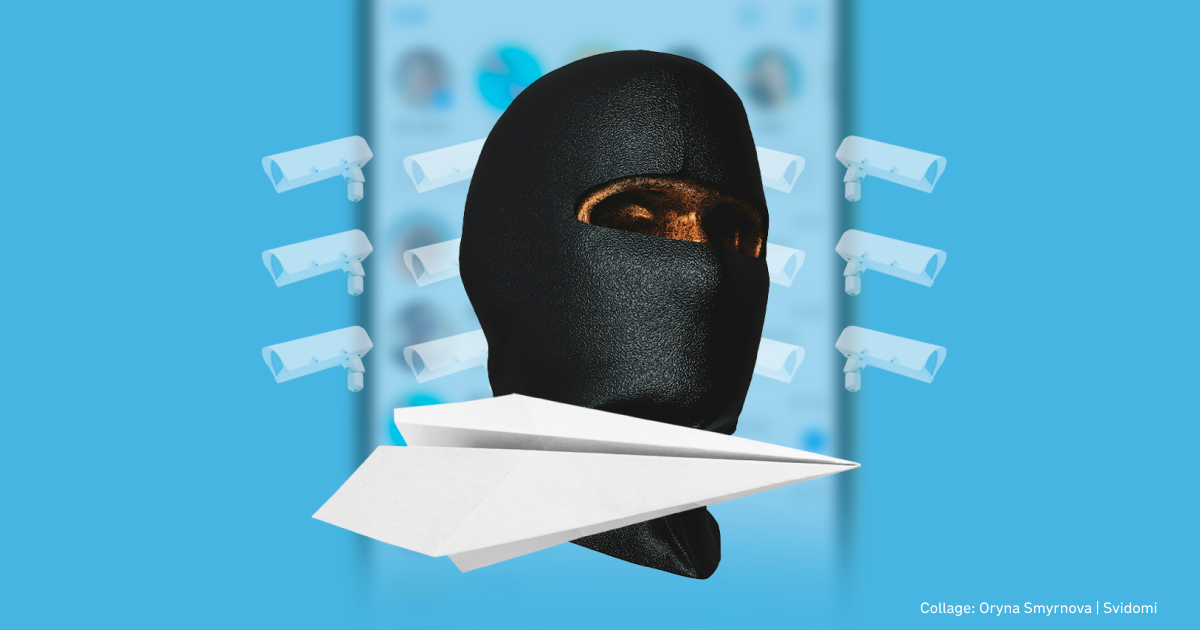
The Russians took former journalist Ihor Bondarenko prisoner when he tried to leave the then-occupied Kherson in the south of Ukraine through Crimea. After the Ukrainian military liberated the city in November 2022, Ihor told hromadske that at customs, a Russian FSB (Federal Security Service) officer had taken his documents, phone, and tablet from him to check them.
Half an hour later, he returned with printouts from Ihor's phone contacts, including the phone numbers of the Right Sector leaders, which Bondarenko had previously deleted. He had also deleted all the Telegram messages for the past six months.
"I knew they were looking for me, but maybe not as persistently as others. I kept in touch with some military men and patriots, passed on information about collaborators, and supported those people who were hiding here,"
said Ihor.
In 2017, the Ukrainian government banned the Russian social networks VKontakte and Odnoklassniki. However, we ended up with the fact that the Russian-made messenger became the most popular in Ukraine. Moreover, it has gained popularity during the full-scale war.
From opposition to "normal cooperation"
Pavel Durov has created an image of a Russian Zuckerberg in exile, leaving VKontakte to Kremlin-connected people and starting a new chapter with the "safe and secure" messenger Telegram.
In 2014, he told The New York Times that the idea for Telegram came about when Russian special forces were outside his door, and Durov realised that he had no secure means of communication to contact his brother.
There was also a time in Telegram's history when it was blocked in Russia. In the spring of 2018, Roskomnadzor, Russia's censorship authority, filed a lawsuit against the messenger for refusing to provide keys to decode users' messages.
The Tagansky District Court of Moscow granted the claim to block Telegram in Russia, although the app was still not completely blocked.
In June 2020, Roskomnadzor suddenly withdrew the requirement to block the messenger and "positively assessed the willingness expressed by the Telegram founder to counter terrorism and extremism".
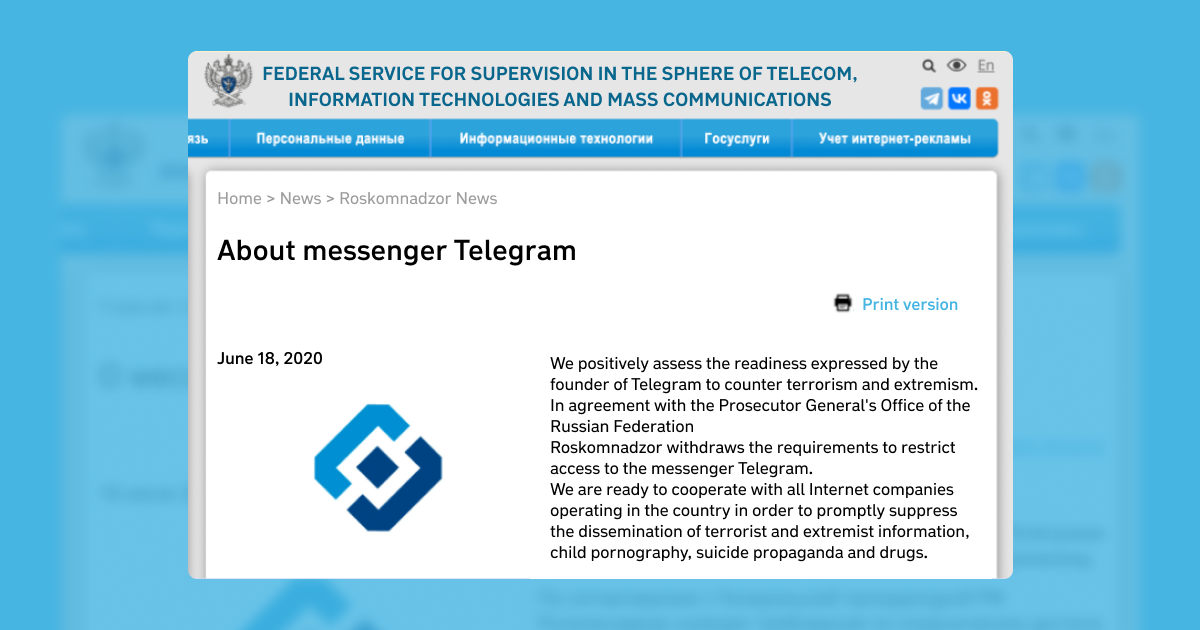
Telegram did not disclose any details about this work. The Russian Interfax news agency sources reported that Telegram administrators did not provide the Russian authorities with encryption keys to their resources but cooperated with specific requests as part of the so-called "countering extremism and terrorism".
It will be recalled that the Russian Federation illegally convicts Ukrainians in the temporarily occupied territories who resist the Russian "authorities" under these articles of the Criminal Code.
Russia has illegally sentenced Crimean artist Bohdan Ziza to 15 years in prison for "terrorism". Ziza poured yellow and blue paint on the temporary occupation administration of Kezlev (Yevpatoriia) on May 16, 2022. The next day, he was detained by Russian security forces.
In the temporarily occupied Crimea, the Russians have set up the so-called "Centre for Countering Extremism", which, according to the National Resistance Centre, has already added more than seven thousand Crimeans to its so-called "extremist database", including more than a thousand Crimean Tatars.
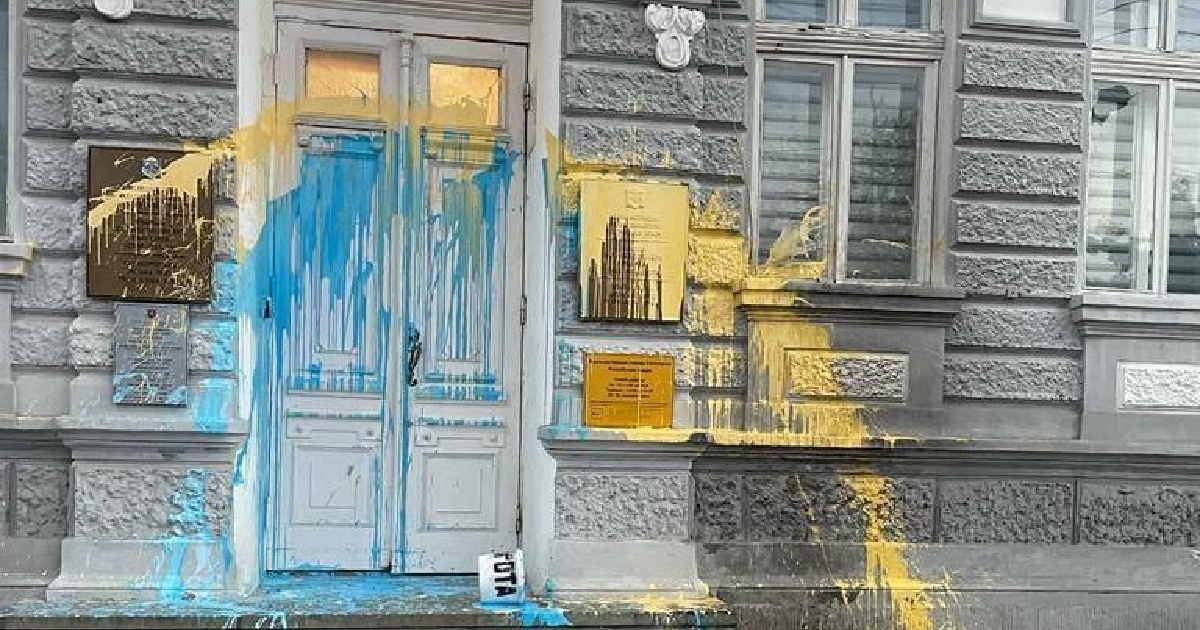
There is no evidence that the FSB has access to their personal data. Still, there are many examples of situations, such as the case of Ihor Bondarenko, described at the beginning of this article.
Let's get back to the Telegram ban in Russia. Three weeks after Roskomnadzor lifted the ban, Telegram's vice-president Ilya Perekopsky participated in a panel discussion with Russian Prime Minister Mikhail Mishustin. Information about the event was published on the Russian government's website.
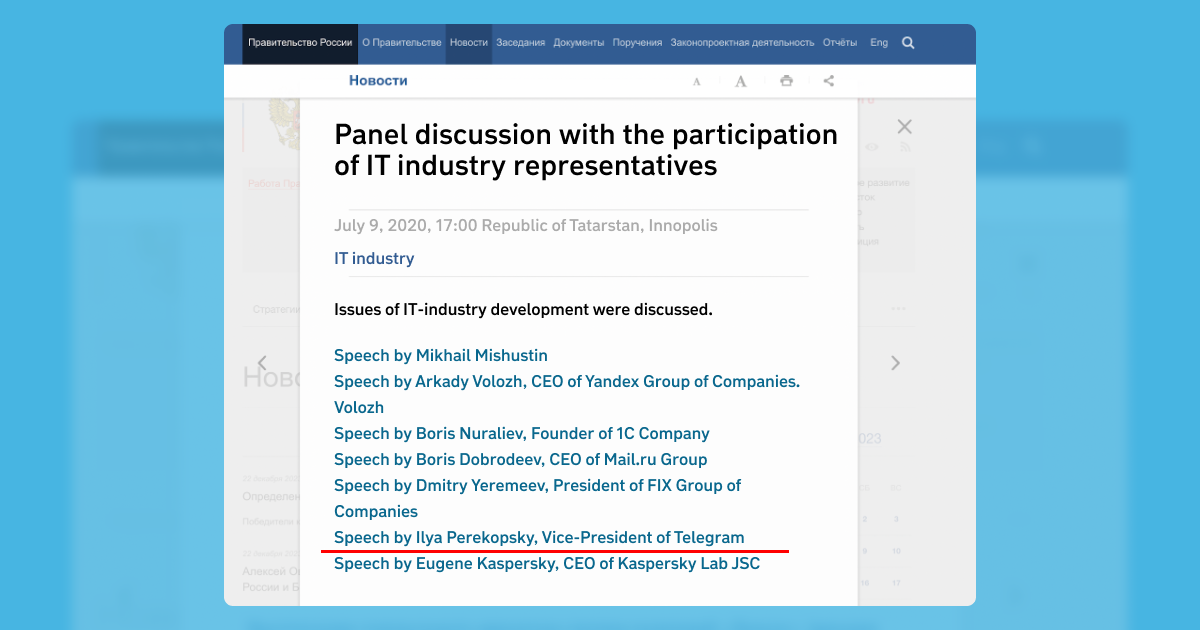
In September of the same year, Perekopsky went buggy-riding with the governor of the Vologda region of the Russian Federation, Oleg Kuvshinnikov (from 31.10.2023 — the former governor — ed.). Perekopsky still has this video on Instagram, and he mocks the Americans in the post's caption.
Kuvshinnikov is a representative of Russia's ruling United Russia party and has been under sanctions from Ukraine, the United States, the United Kingdom, and Canada since 2022 for supporting Russia's invasion of Ukraine.

Russian President Vladimir Putin also noted the agreement between the messenger and the authorities, saying that the app and the authorities cooperate properly.
The official position of Telegram is that "no agreements have been made to unblock the social network in Russia".
"After two years of unsuccessful attempts to block Telegram, the newly appointed Prime Minister of Russia (Mikhail Mishustin — ed.) cancelled the previous government's ban. Since the app was already freely available, Telegram did not need to "offer" anything in exchange for its "unblocking" the messenger's press service reports.
Durov noted in his post that Telegram moderators had become more effective in combating banned content, allegedly enough for the Russian government to officially unblock Telegram.
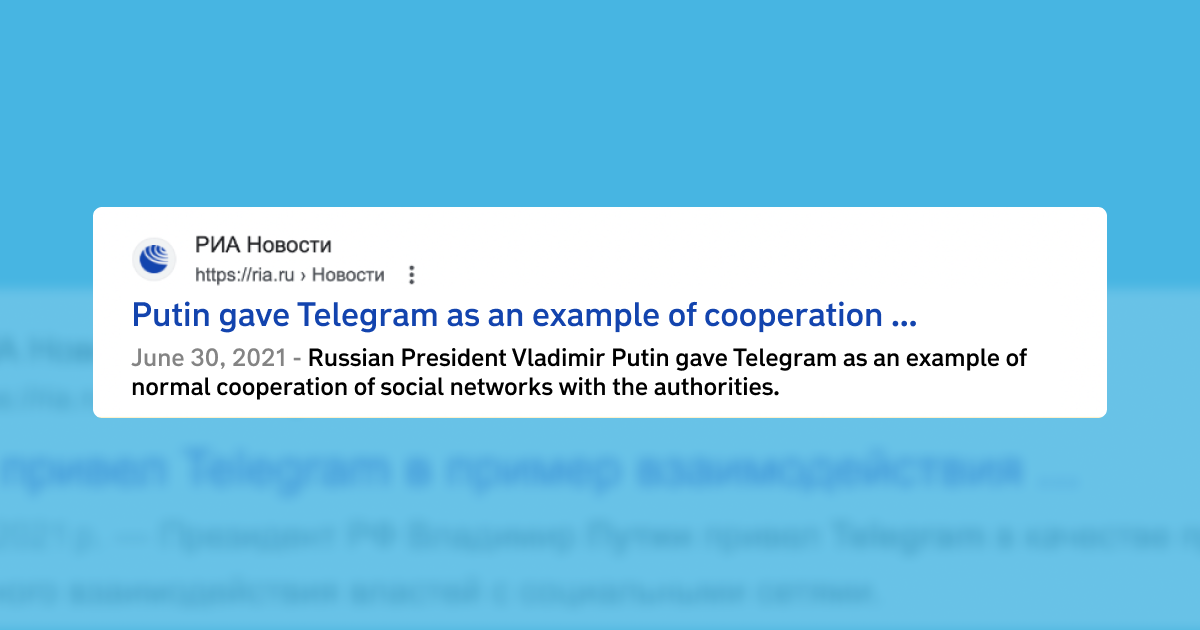
In a letter to the media outlet Svidomi, Telegram's official representative office wrote, "It is wrong to call the messenger Russian, as the company has no employees, equipment or offices in Russia. "
Read the article by Vector media outlet describing Telegram's ties to Russia: from VK developers to investors and designers.
As for the case of Igor Bondarenko from Kherson, Telegram claims that the FSB cannot access the messenger's chats. The possibilities in this case are
1) The FSB agent used Cellebrite tools to physically extract undeleted messages from Ihor's device (see CPJ and Haaretz).
2) Someone had access to the man's account before he deleted the messages.
3) Ihor deleted the conversations, but some of his contacts had been detained or compromised by the FSB earlier — and these conversations had been extracted from those contacts' devices, then shown to Ihor later.

The role of the messenger during a full-scale war
On March 7, 2022, Pavel Durov published a post on his personal channel stating that the "tragic conflict" (Russia's full-scale war against Ukraine — ed.) is personal for him and the platform — his mother's family is from Ukraine. He recalled how he left Russia in 2014.
"I was the CEO of VK, which used to be the largest social network in Russia and Ukraine. In 2013, the Russian security agency, FSB, demanded that I provide them the private data of the Ukrainian users of VK who were protesting against a pro-Russian President (referring to Euromaidan activists and former Ukrainian President Viktor Yanukovych — ed.) I refused to comply with these demands because it would have meant a betrayal of our Ukrainian users. After that, I was fired from the company I founded and was forced to leave Russia. I lost my company and my home, but I would do it again without hesitation," Durov wrote.
The Telegram founder noted that he no longer lives in Russia, has no companies or employees there, and that the right to privacy of the messenger's users is "sacred" to him.
At the same time, five days after this post, Russian State Duma deputy Oleg Matveichev said that Durov "found a compromise with the FSB" and the messenger "installed equipment that will allow us to monitor all dangerous subjects."
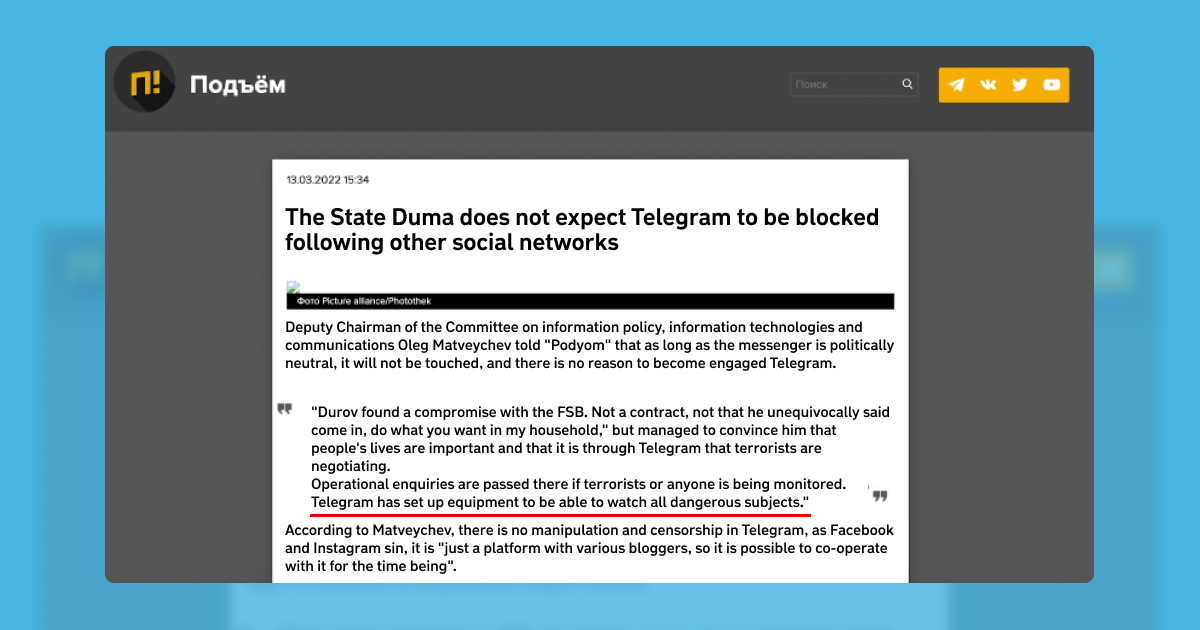
Moxie Marlinspike, founder of Signal, Telegram's US competitor, wrote on X (Twitter) that "after a decade of misleading," most people believe that Telegram is an "encrypted app." However, according to him, Telegram is, by default, a cloud-based database with a plaintext copy of every message.
"Every message, photo, video, and document sent/received over the past ten years, as well as all contacts, group memberships, etc., are available to anyone with access to the database. Many Telegram employees have family in Russia. If Russia doesn't want to bother with hacking, they can leverage the family safety for [pressure on employees and] access," Signal's founder wrote on February 25, 2022.
Besides being a competitor to Telegram, Signal is one of the most secure messengers, according to a study by the OSINT community Molfar, with a score of 56, while Telegram scored 26.
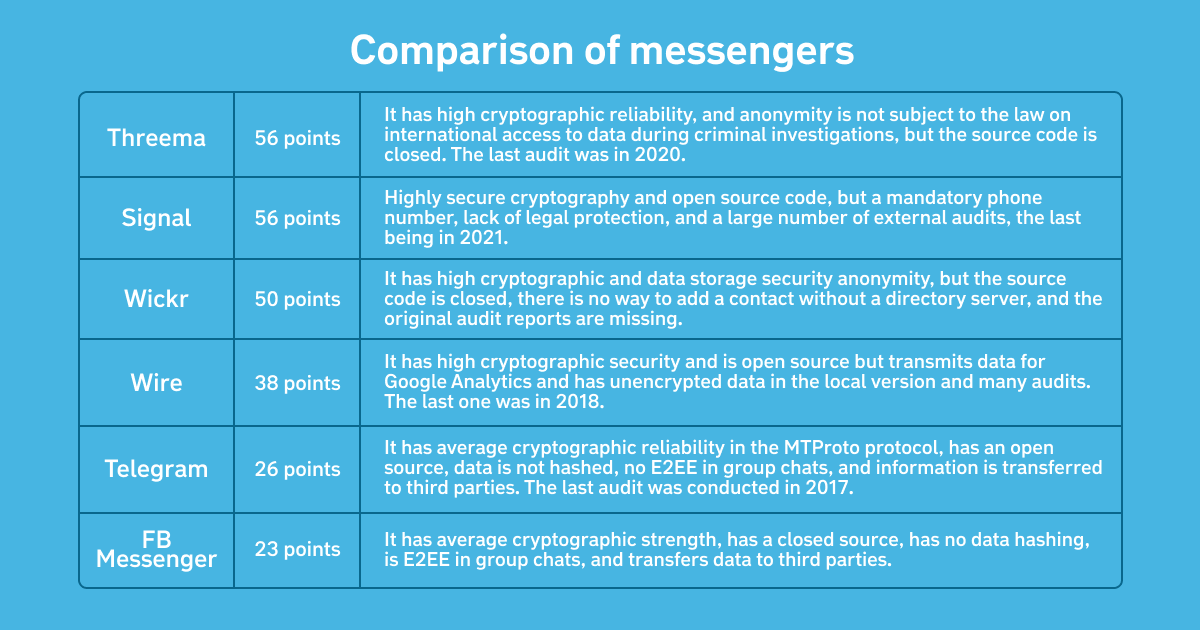
Molfar warns that standard Telegram chats do not have end-to-end encryption. It is used only during transmission (between the server and the end-user), but the app does not encrypt data at rest. That is, messages that have already been sent are stored unencrypted on the app's cloud servers. In theory, they can be accessed by Telegram employees.
"The same goes for groups and channels on Telegram (whether public or private). Everything published there, including files and multimedia files, is not private. If you care about privacy and security on Telegram, perhaps the only way to achieve this is to use "secret chats"," the OSINT community adds.
Telegram claims that everything stored on its servers is securely encrypted, and the encryption keys protecting it are never stored with the data.
The New York Times reports that Russia's FSB has obtained technology that allegedly allows it to monitor communications on encrypted messengers Telegram, WhatsApp and Signal, track the location of phones, identify anonymous users and hack accounts. The newspaper cites documents from the suppliers of such software and a person involved in digital surveillance operations in Russia.
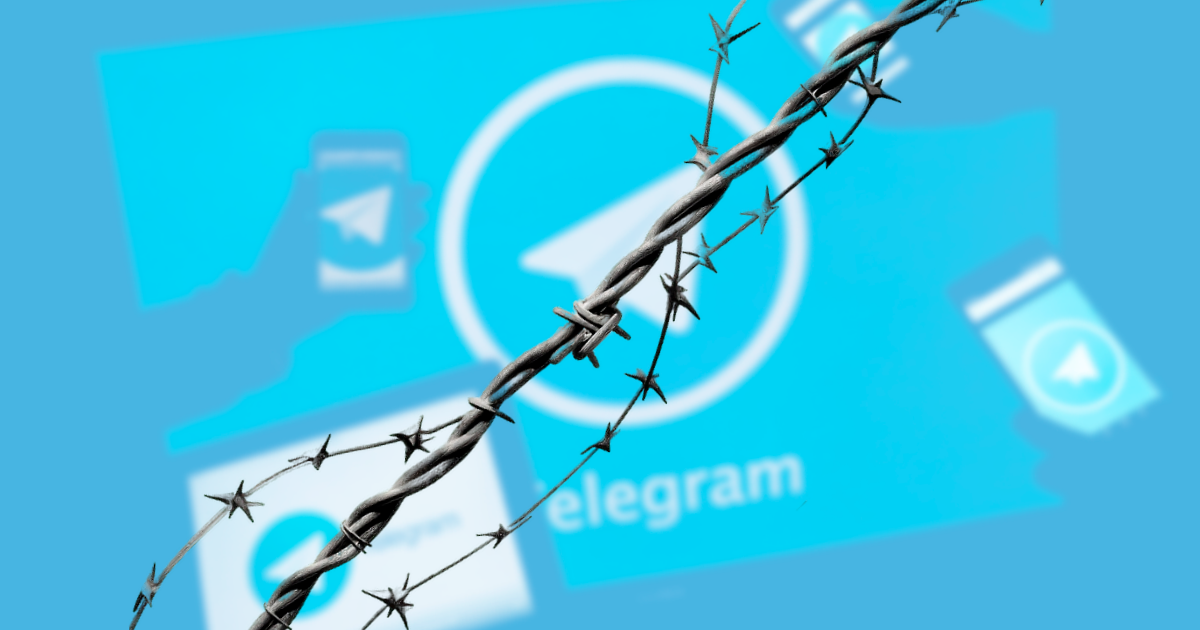
Telegram spokesperson Remi Vaughn wrote in a letter to Svidomi that this is irrelevant for Telegram in Ukraine since Russia has no control over Ukraine's networks.
According to the NYT, the software cannot intercept specific communications, but it can determine if someone is using multiple phones, map their relationship network by tracking communications with others, and identify which phones were in certain locations on a particular day. Another product is believed to collect passwords entered on unencrypted websites.
If it is true, Telegram is especially dangerous for the military, whose location can be tracked by the Russians. Yehor Aushev, an expert at the Cyber Warfare Research Institute, said at a press conference at the Ukraine-Ukrinform Media Centre that when the military uses Telegram with geolocation enabled, it can lead to Russian attacks being directed to the location of the device or where there are clusters of people with the same geolocation.
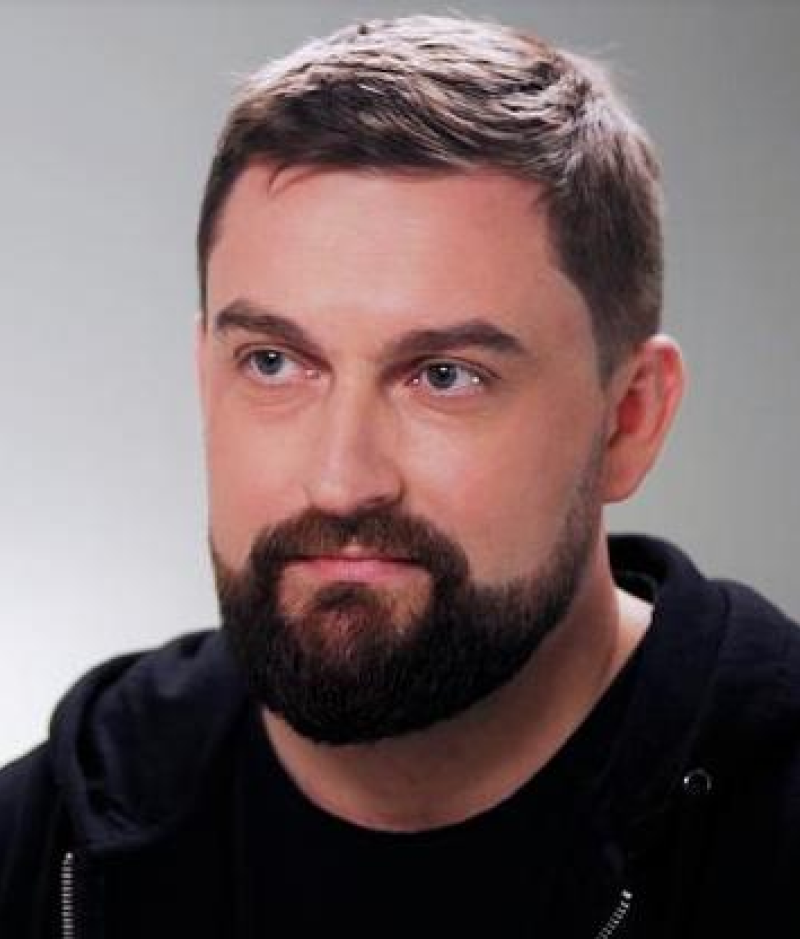
"When foreign partners call me, they ask: "Why do people in Ukraine still use the Russian messenger?" Let's not use this unreliable messenger, at least for those issues related to security or work,"
Aushev urges.
Since the outbreak of full-scale war, Telegram has become particularly popular in Russia and Ukraine: Russian authorities have labelled Meta an "extremist" organisation. At the same time, Ukrainians have turned to it for news because Telegram does not regulate content and does not remove it for "excessive violence" like Meta's Instagram and Facebook.
An Internews study on Ukrainians' attitudes and trust in the media in 2023 found that 72% of citizens get news from Telegram. The most popular channels include Trukha Ukraine (2.5 million subscribers) ( an official spokesperson is known, the channel's editorial staff is unknown), Ukraine Online (1.1 million) (founders and editorial staff are anonymous), and Lachen Writes (1.3 million) (founded by blogger and volunteer Ihor Lachenkov).
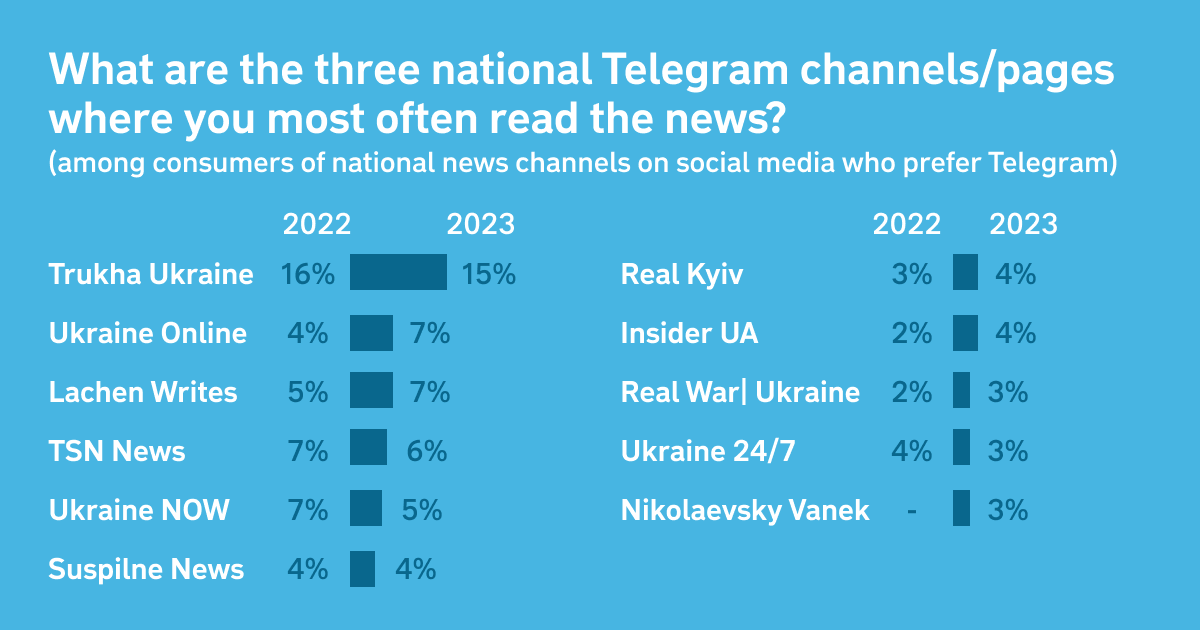
Maksym Lavrynenko, founder of the Trukha channel network, told Svidomi that he considers Telegram to be safe in terms of data protection and does not think it could come to the point where it is banned in Ukraine.
"Russian Pavel Durov founded it, but we remember what happened ten years ago when he was deprived of his VKontakte and left Russia altogether. And now Durov is denying his Russian citizenship. I think it is a bit wrong to say that a Russian created it because he was in the opposition ten years ago," Lavrynenko said.
Ihor Lachenkov, the author of the Lachen Writes channel, wrote on his Twitter account X that there is no single secure messenger, but Telegram is the best way to communicate with the audience.
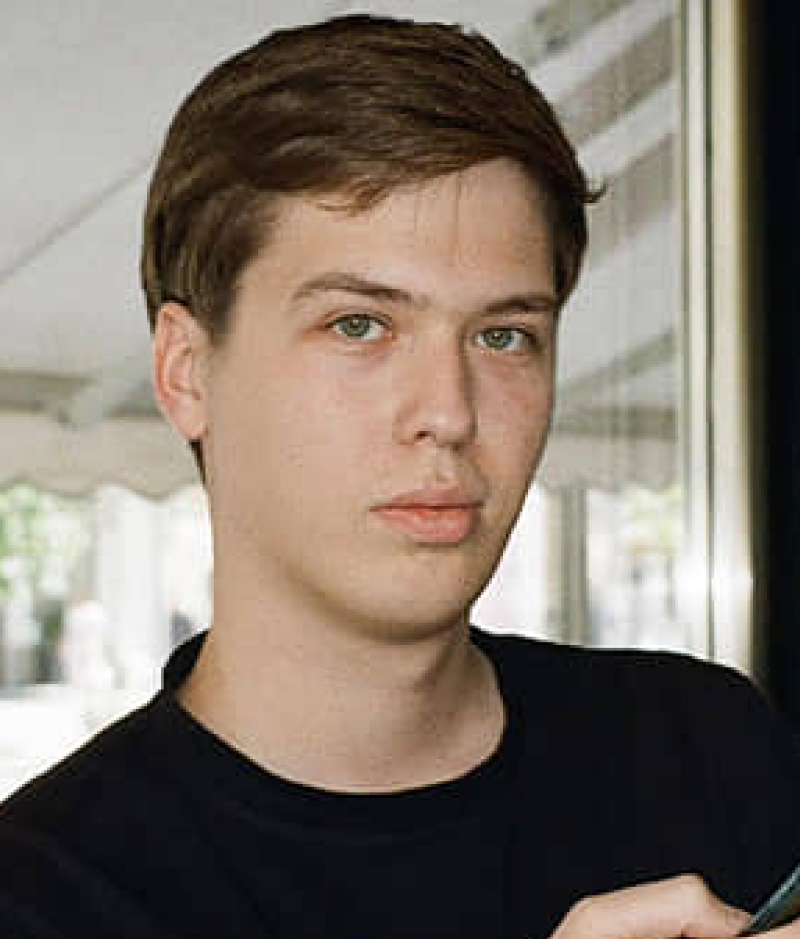
"Hundreds of millions are raised for the Ukrainian armed forces through Telegram. This messenger has become one of the best platforms for communication because of the complete lack of censorship, unlike Meta, where you can be banned forever for saying "rusnia" (a derogatory form of the word "Russians"— ed.)",
Lachenkov wrote.
One of the main reasons for the popularity of Telegram is the channels that publish real-time information about the movement of Russian missiles and drones in Ukrainian airspace. The Ukrainian Air Force also has a WhatsApp channel, but they still have a 28 times larger audience on Telegram (25,000 vs 700,000).
There is also an ongoing debate in Ukrainian media about the safety and future of Telegram in Ukraine. Some publications also have channels on WhatsApp and Viber. If journalistic outlets leave Telegram altogether, there is a risk that Ukrainians will be left with anonymous channels that publish unverified information or manipulate clickbait headlines.
Ukrainian cyber experts have already begun to raise the issue of Telegram security. Yaroslav Azhniuk, co-founder of the Ukrainian IT company Petcube, announced the launch of a new project, Kremlingram.org, which investigates Telegram's ties to the Kremlin based on open data.
In response to the project, Telegram reiterated that the messenger was created specifically to protect users from Russian surveillance, that its founder was expelled from Russia before the app was released to protect Ukrainians' data, and that Telegram "is and has always been safe for Ukrainians and users around the world."
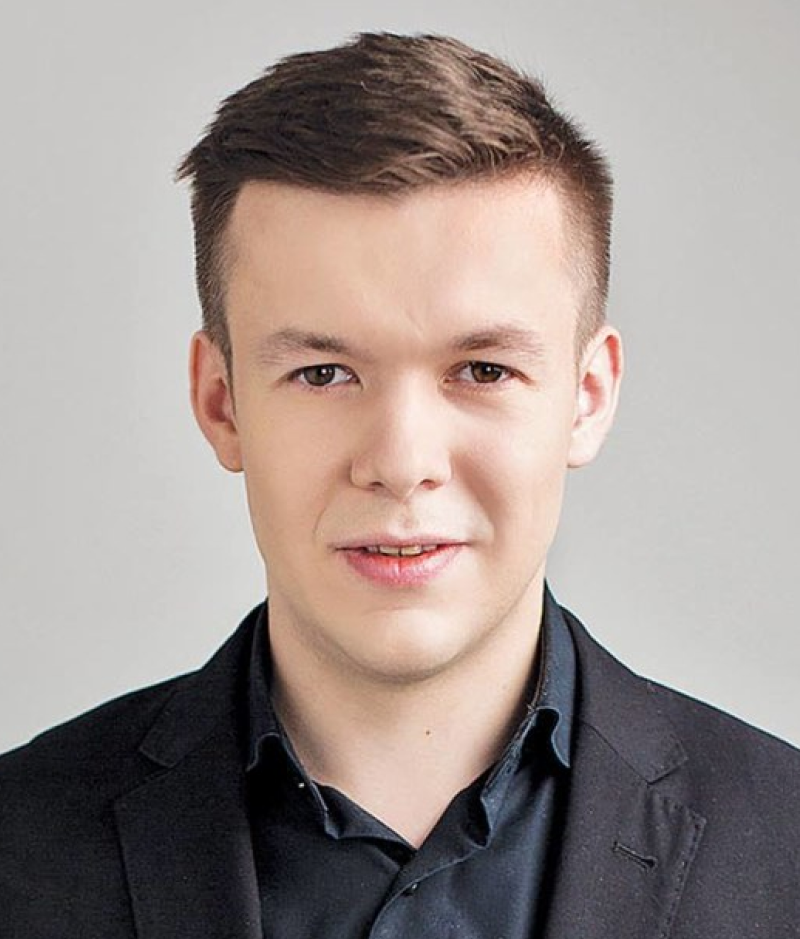
"The focus for Ukraine should be on Telegram. There is no point in having wartime restrictions in the form of a telethon when twice as many Ukrainians receive information through a completely unmoderated dump of Telegram, the infrastructure of which is probably controlled by the Russian authorities,"
Azhniuk writes.
The state's attitude: warning or playing games
The state does not have a single policy on Telegram. Ukrainian officials and government agencies, including law enforcement, have verified channels on social networks.
In a comment to Detector Media, Serhii Nikiforov, the spokesman for Volodymyr Zelenskyy, suggested that the FSB could control Telegram because it is owned by the Russian Pavel Durov, who refuses to be regulated, unlike Meta or the X network. At the same time, he says that we cannot ignore the fact that this messenger is the most frequently used by Ukrainians.
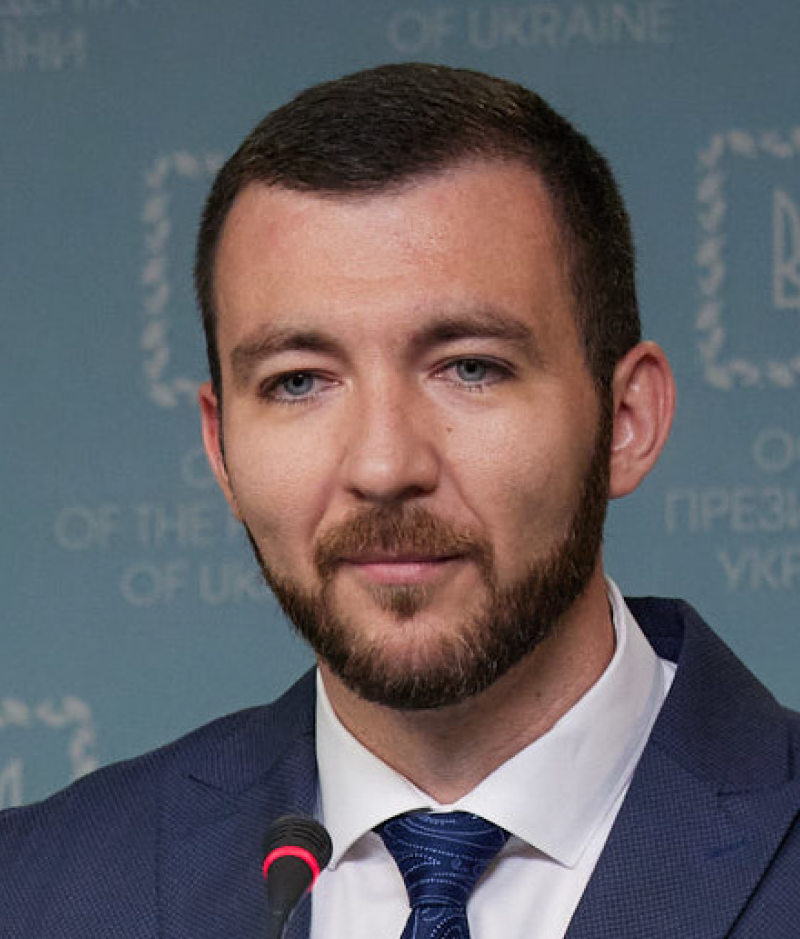
"There are indeed questions about Telegram. They relate to security and regulatory issues. But with all these fair and objective questions, Ukrainians have made their choice, and we have to consider that. And Ukrainians, whether we like it or not, call Telegram channels their first source of information. That is the first thing. Secondly, Russia pays a lot of attention to propaganda through Telegram channels. And it is only thanks to our Ukrainian Telegram channels, which have developed over time and occupied this niche, that we have managed to block Russian propaganda in this area,"
Nikiforov says.
Representatives of the defence sector already see the danger of using Telegram. Oleksii Danilov, the former secretary of Ukraine's National Security and Defence Council, calls the messenger "a dangerous thing from the point of view of national security" and says he does not have the app on his phone.
In an interview with Liga.net, when asked whether the authorities plan to ban Telegram, he replied: "Can you imagine the investments people have made? There are whole camps there that have invested in all this equipment, buying SIM cards. I will say this: if we receive documents from the relevant services that have the right to do so, believe me, it will not take long for us to do so".
Andrii Yusov, a representative of the Defence Intelligence of Ukraine, told Svidomi that Russian special services are now investing "huge amounts of money" in developing Telegram projects, particularly in the context of information and psychological operations.
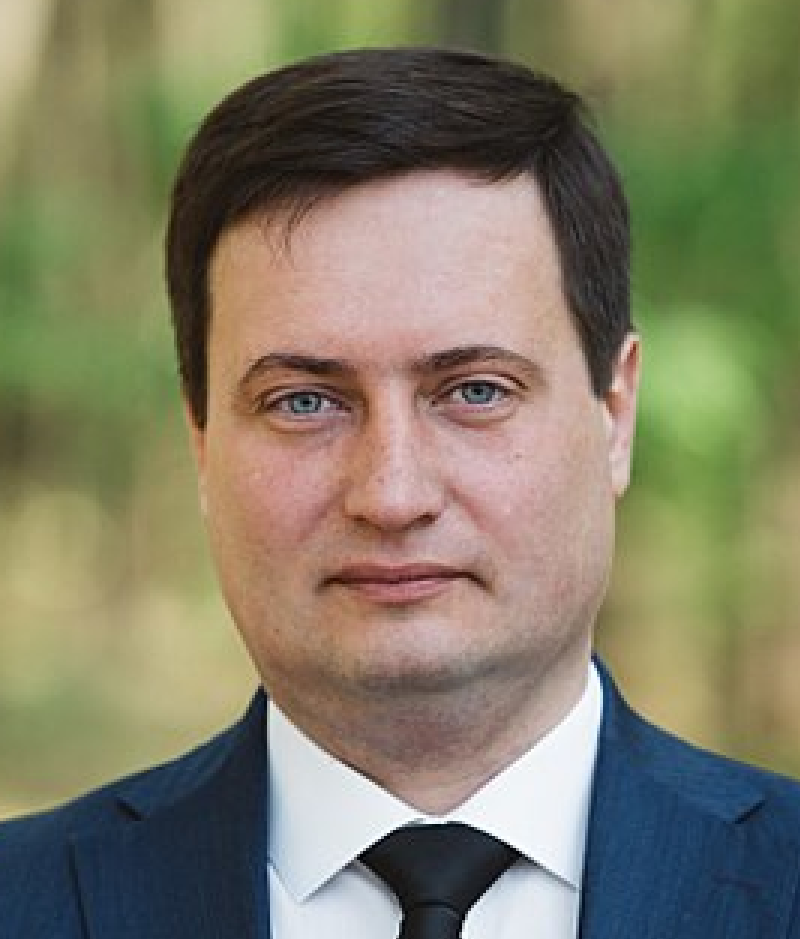
"In terms of data protection and vulnerability, this programme is definitely not secure and is not recommended for use in Ukraine's Security and Defence Forces. There have been attempts to obtain databases. We are taking the necessary measures,"
Yusov said.
The head of Ukrainian intelligence, Kyrylo Budanov, said that although Telegram can be used to convey information to people in the occupied territories, the messenger is still a problem from the point of view of Ukraine's national security."I am absolutely against the violation of freedom of speech. But this is going too far. In other words, anyone can create a channel and write whatever they want on it, and when they start doing something, they can hide behind the fact that it's freedom of the press. But this is not freedom of the press. It's called something else," Budanov said at the Kyiv Stratcom Forum 2024 at the end of March.
Yaroslav Yurchyshyn, chairman of the Ukrainian Parliament's Committee on Freedom of Speech, agrees that blocking Telegram would not violate freedom of speech because he believes freedom of speech is a derivative of personalisation. Telegram, on the other hand, has a lot of room for anonymity. Yurchyshyn says that Telegram used to ignore appeals from the Ukrainian authorities. Now, a dialogue has begun with individual representatives of the messenger.
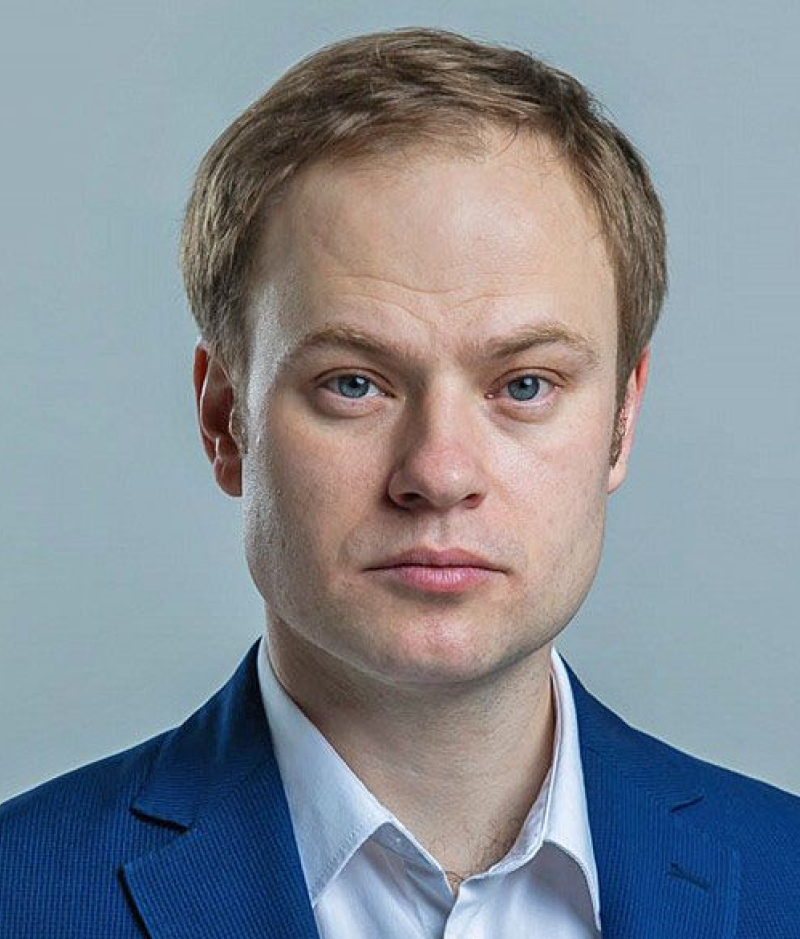
"To block Telegram, you need a clear argument — a decision by the National Security and Defence Council on sanctions, for example. And that requires a serious critical situation with a leak of information. We don't want that to happen, so we must make a choice,"
says Yaroslav Yurchyshyn. And it seems that it should be a political choice.


